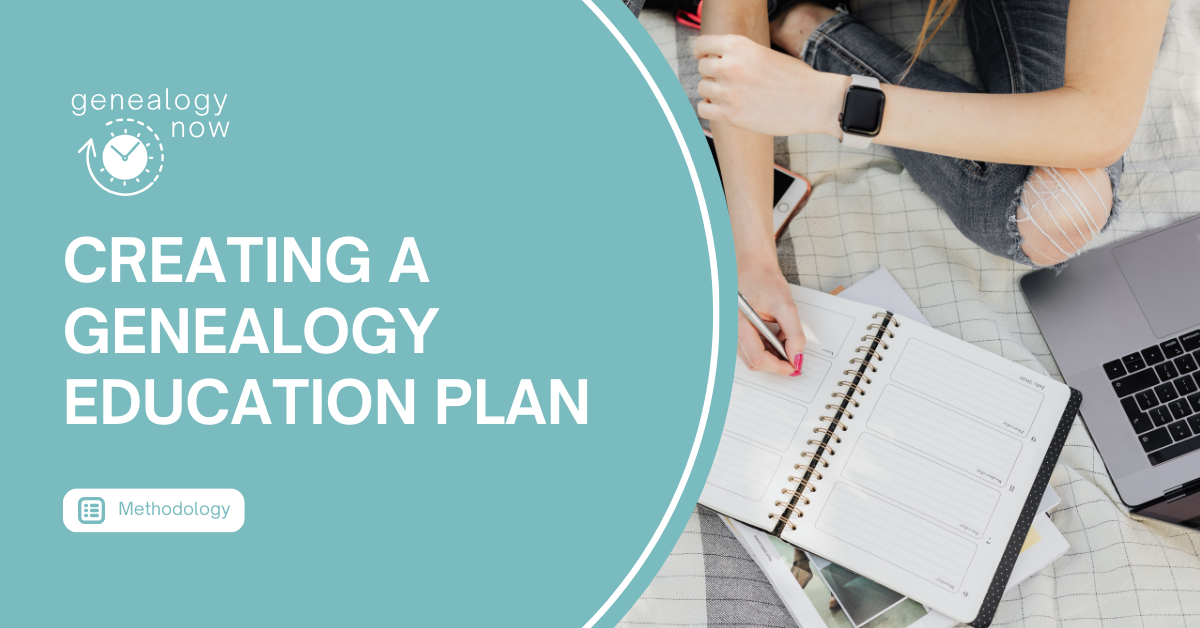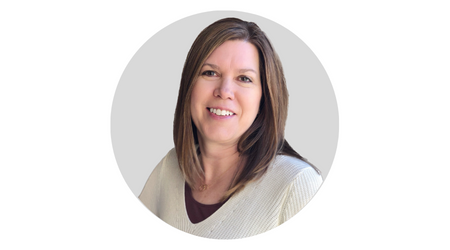
Have you wanted to learn more about a particular aspect of researching your family history but didn’t know where to start? Creating a genealogy education plan can provide the motivation and guidance needed to gain additional skills in your areas of interest. Take some time to evaluate your strengths and weaknesses and determine your learning style, then consider your goals and survey educational opportunities that will help you reach them.
How to Determine Your Learning Style
A fantastic resource for determining your learning style is the VARK questionnaire. Answer a series of questions to learn whether you are a Visual, Aural, Read/Write, or Kinesthetic learner, then receive a link to strategies for taking in information, presenting information, and ideas for utilizing these strategies in education and workplace settings. My learning style is Read/Write. In a nutshell, Read/Write strategies center around taking notes and organizing written information into lists, tables, and other written content.
Set Educational Goals
The next step in creating your education plan is to decide what your goals are. Do you want to learn more about researching in a particular locality? Are you interested in increasing your knowledge of certain record types or methodologies? Perhaps you would like to learn more about utilizing DNA evidence in your research. When I was working toward accreditation, I focused my education on learning about research methodologies for the Mid-Atlantic states and important record types and repositories for that region. My next educational goals included increasing my knowledge and skills in the area of genetic genealogy and improving my writing skills. I am currently focusing on advanced methodology and taking a deep dive into select record types like land and court records.
Opportunities for Genealogy Education
Whatever your goals, today’s world provides many educational opportunities that are easily accessible. Whether through books, journals, blogs, webinars, study groups, conferences, or comprehensive courses, you will be able to further your knowledge on all kinds of genealogy topics. Use what you learned from the VARK questionnaire to customize your 2024 education plan and get the most out of each experience.
Below are some amazing virtual options for furthering your genealogy education. Check with your local genealogical society or FamilySearch Center for in-person options near you.
Beginning Genealogy
Visit the GenealogyNow Learning Center to access my free Research 101 course.
The National Genealogical Society offers a Foundations in Family History series that consists of three courses that build on one another.
The Family History Guide has online lessons that teach how to use the major family history websites. This is a great resource for beginners!
Webinars
Legacy Family Tree Webinars gives a great bang for your buck, offering On Demand access to their entire library of Webinars on many different topics for a reasonable subscription fee.
To learn more about research methodology, check out the Research Like a Pro Webinar Series hosted by Diana Elder and Nicole Dyer at FamilyLocket. Each month, a researcher will present a case study that highlights the Research Like a Pro process and showcases the use of historical documents and sometimes DNA evidence. I will be presenting a DNA case study for this series in April.
FamilySearch hosts webinars each month. They have amassed a large library of recorded classes on all kinds of topics. If you have ancestors from countries outside the United States, this is a great resource!
The BYU Family History Library also has a library of webinars available.
YouTube Videos and Podcasts
These are two types of media that are great for learning about genealogy. Here is a list of genealogy podcasts to peruse. And here is a list of YouTube channels you can take a look at.
Institutes
If you are interested in an in-depth course on a specific topic, consider enrolling in an institute course. I have taken several institute courses and I have loved the deep dive into my topics of interest. There are several Institutes to choose from, including the following:
The Salt Lake Institute of Genealogy (SLIG). Their next institute will be held virtually January 22-26, with Spring sessions happening February through April. They have limited seats available for both sessions.
The Institute of Genealogy and Historical Research (IGHR). Their next institute will be held virtually on 21-26 July 2024.
The Genealogical Research Institute of Pittsburgh (GRIP) now part of the National Genealogical Society. They are offering two institute sessions, one online in June 2024, and one in person in Pittsburgh in July.
Journals
One way to learn more about research methodology and the types of historical documents that might help you solve your family history mysteries is to read professional journals. Major journals include the National Genealogical Society Quarterly, The New York Genealogical & Biographical Society Record, The New England Historical and Genealogical Register, and others. Your state or local genealogical society might publish a journal or magazine that will help you learn how to research in your state.
Books
Books are a wonderful way to learn more about genealogical research. There are many books on a wide variety of genealogical topics. Family Tree Magazine has compiled a list of genealogy books that will help get you started.
Blogs
Thousands of genealogy blogs make it possible for you to find articles and information on an array of topics via a simple Google search. To see a listing of genealogy blogs, visit Geneabloggers.
Conferences
Genealogical societies all over the world host annual conferences with professional presentations on a variety of topics. While most conferences used to take place in person, many are currently being held virtually. Conference Keeper is the place to go to learn about upcoming events.
One conference to be aware of is RootsTech, the world’s largest genealogy conference. Taking place annually, it will be held February 29 – March 2 in 2024. There will be an in person event in Salt Lake City with a free virtual component. The virtual version will include pre-recorded content in addition to livestream feeds of a few classes every hour. This is a wonderful learning opportunity with classes for all skill levels. I will be presenting two classes this year: Climbing Your Branch of the FamilySearch Family Tree, and Writing Your Family History: 5 Strategies for Greater Efficiency. Register now for either version of the conference. The complete class schedule will be released on January 8.
Study Groups
Study Groups are another great learning opportunity. One big reason why I like them is that they are usually interactive and often incorporate peer feedback. I always learn so much from my peers in these settings! The first study group I ever participated in was a Research Like a Pro Study Group hosted by Diana and Nicole from FamilyLocket. They also offer a Research Like a Pro With DNA Study Group. I have participated multiple times in each one, and I highly recommend them! They are what helped me really learn the research process and how to solve brick wall problems.
ProGen is another fantastic study group. Participants work through assignments and have discussions based on the book Professional Genealogy, edited by Elizabeth Shown Mills. I participated in ProGen 53 and am currently mentoring ProGen 66. It’s a valuable educational experience for aspiring professionals.
The ICAPGen Study Groups are another option I have a lot of experience with. If you are preparing for accreditation through ICAPGen, they will help prepare you for submitting your Level One project and for Level Two and Three testing.
Another valuable study group option is an NGSQ study group. Participants read and discuss an article from the National Genealogical Society Quarterly each month. There are formal groups, or you can simply gather some of your peers and form your own group. I look forward to meeting with my little group of self-coined “genealogy nerds” each month. Our meetings have helped me stay motivated to regularly study journal articles. I learn from each article we read. The genealogists in our group have different areas of expertise, and I learn from what they each notice and have to offer in our discussions as well.
Other study groups that I am familiar with but haven’t yet participated in include GenProof, based on the book Mastering Genealogical Proof by Tom Jones, and several study groups hosted by Cari Taplin and Cyndi Ingle. A Google search or inquiry among your genealogy friends will certainly lead you to additional options.
Conclusion
There is always more to learn in the field of genealogy. New advancements in technology and record access provide amazing opportunities for growth and discovery. What will you add to your education plan this year?
